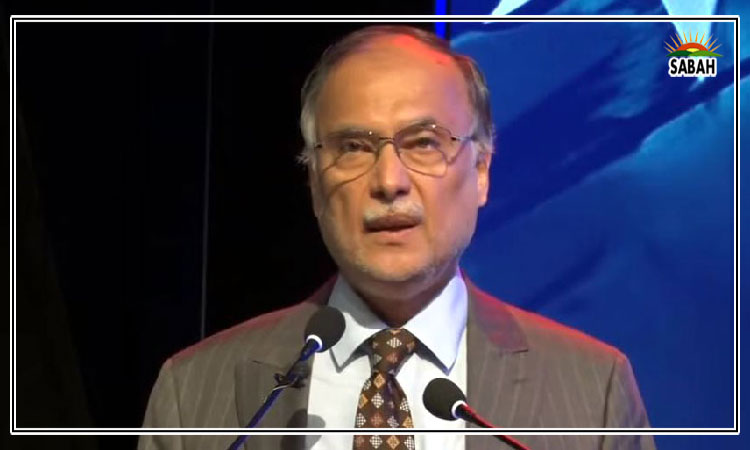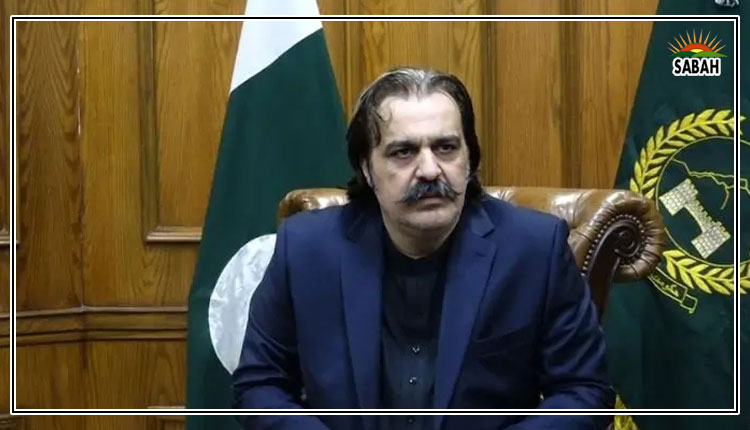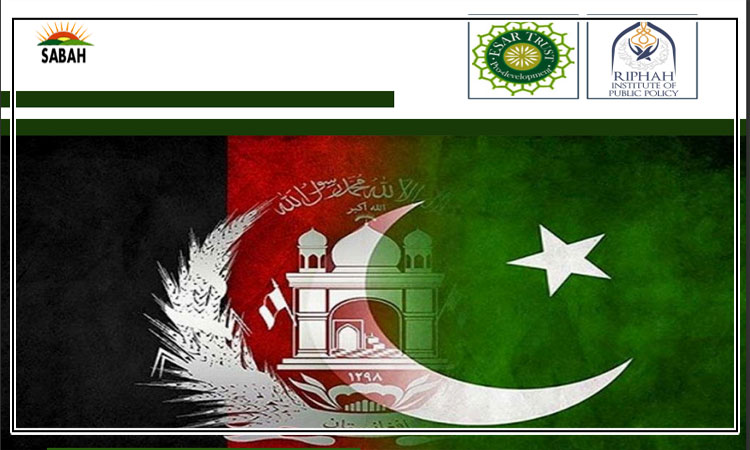Riphah Institute of Public Policy & ESaR Trust jointly organise seminar entitled ‘Security Paradigm and Rising Tensions: Pak-Afghan Relations and Election Integrity’
ISLAMABAD, August 20 (SABAH): The Riphah Institute of Public Policy and ESaR Trust jointly organised a seminar entitled “Security Paradigm and Rising Tensions: Pak-Afghan Relations and Election Integrity” at the Riphah Institute of Public Policy Islamabad.
The seminar featured an esteemed panel of guest speakers, including Lt. Gen (Retd) Khalid Naeem Lodhi, Abrar Hussain (Ex Ambassador of Pakistan), Tariq Junaid (Executive Director IPOR), Dr. Iftikhar Firdous (Founder of Khorasan Diary), Dr. Adam Saud (Dean Faculty of Social Sciences, Bahria University Islamabad), Arif Ansar (Chief Analyst at PoliTact USA), Dr. Iqbal Khalil (Chairman Institute of Regional Studies
Peshawar), Dr. Rashid Aftab (Director Riphah Institute of Public Policy Islamabad), and Syed Belal (President ESaR Trust).
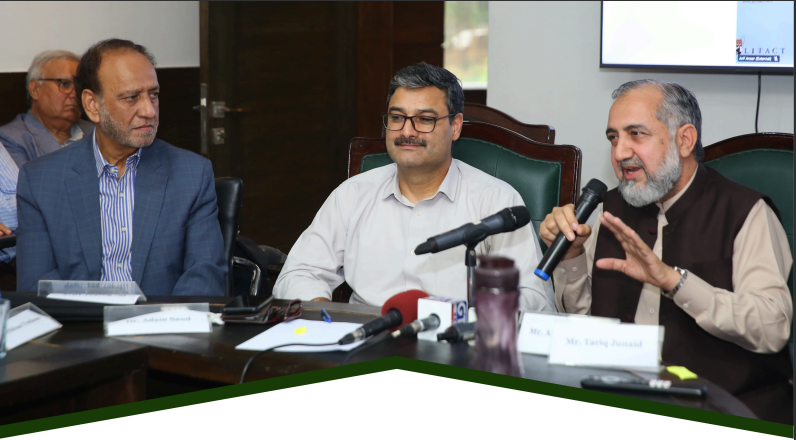
The event provided a platform for these distinguished experts to discuss and analyse the evolving security landscape, the complexities of Pak-Afghan relations, and the integrity of electoral processes in Pakistan.
Syed Belal, President ESaR Trust; opened the seminar and expressed that: Military attacks inside Afghanistan or on Pak army installations escalate tensions. Imposing mandatory passports for border area residents could worsen the situation. The upsurge in terror attacks in Pakistan which are linked to TTP and other antiPakistan forces in Afghanistan. Issues related to the Durand Line, smuggling, illegal migrants involved in terror attacks and Indian investment have added complexity to the situation Security paradigm viz-a-viz to Afghanistan needs to redefine Role of China, Iran, and Russia concerning terrorism and the Taliban are important. Encouraged speakers to provide practical, viable solutions for security challenges. Which may bring stability and contribute to sustainable, peaceful resolutions in the
region.

Dr. Muhammad Iqbal Khalil, addressed the historical background and underlying causes of tension between Pakistan and Afghanistan. He emphasized Pakistan’s longstanding commitment to assisting Afghan refugees, noting that the country has provided extensive support to approximately five million Afghan refugees over the years. However, he expressed concern over the current anti-Pakistan sentiments within the Afghan government, which remain difficult for Pakistan to comprehend given this history of support. Dr. Khalil underscored the need for highlevel talks to address and resolve the mutual issues between Pakistan and Afghanistan. By engaging in open dialogue and fostering collaboration, both countries can work towards restoring
trust and improving bilateral relations.
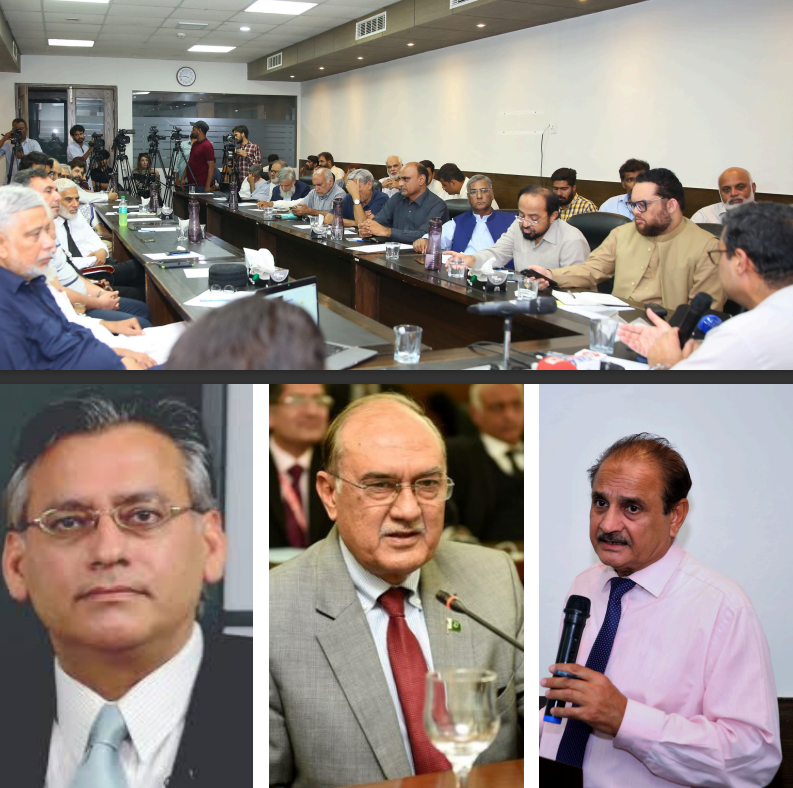
Tariq Junaid opined that elections in Pakistan have a chaotic history, often tarnished by allegations of rigging and lack of transparency. Since the country’s beginning, the political landscape has been heavily influenced by both civilian leadership and the military establishment,
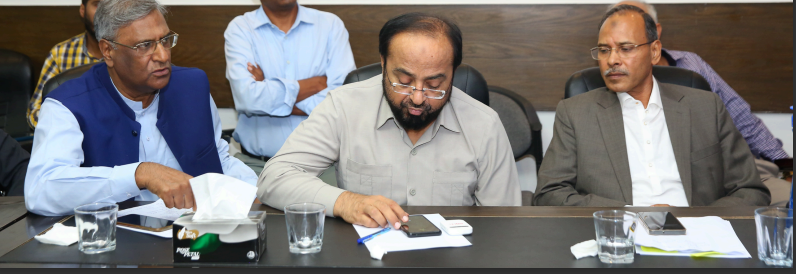
with frequent interruptions of democratic processes through coups and impositions of martial law. The 2018 general elections, which brought Imran Khan’s government to power, were widely criticized as being a product of a “hybrid regime”. This led to serious consequences both
domestically and internationally. Locally, the elections marginalized various political groups, leading to increased polarization. On the international stage, Pakistan faced scrutiny and condemnation, with resolutions being passed against the perceived lack of transparency in its electoral process.
Historically, elections in Pakistan have often been viewed with skepticism by the public. From the first elections in the 1950s to the more recent ones, allegations of vote rigging, manipulation, and
undue influence by the military have been consistent themes. This has resulted in a significant portion of the population losing faith in the electoral process. According to the Democracy Index, Pakistan’s ratings have fluctuated, reflecting the ongoing challenges to democratic consolidation.
Surveys suggest that while the people of Pakistan desire a democratic form of government, there is a growing disillusionment with the integrity of elections. To restore faith in the electoral process, several steps need to be taken. These include ensuring greater transparency in the conduct of elections, strengthening the independence of the Election Commission of Pakistan, and allowing for more robust monitoring by both local and international observers. Additionally, political parties need to engage in electoral reforms that address the concerns of the electorate, ensuring that all groups feel represented and that their votes truly count. Only through such measures can the people of Pakistan begin to trust the electoral process and accept the results of future elections.
Lt. Gen (Retd) Khalid Naeem Lodhi emphasised the importance of distinguishing the Afghan government from entities like RAW and TTP, warning that lumping them together would play into the hands of adversaries. He highlighted the sophisticated use of perception management techniques, including misinformation, disinformation, and false flag operations, which are currently at full play. To counter these strategies, he urged a comprehensive approach that includes the strategic use of media, such as creating and dubbing movies and dramas in commonly spoken languages to foster understanding and cooperation.
Lt. General (Retd) Khalid Naeem Lodhi underscored Afghanistan’s significant impact on Pakistan—politically, economically, socially, and in terms of security. He advocated for a dual approach: combating the TTP while simultaneously engaging in more frequent dialogues with the Afghan government. He also suggested seeking China’s assistance to improve bilateral relations with Afghanistan.
Furthermore, Lt. General (retd) Lodhi proposed establishing border markets and opening new border crossings to facilitate trade, business, and visits between the two nations. He even suggested offering citizenship and residency to Afghan nationals residing in Pakistan as a means of fostering goodwill. Strengthening diplomatic relations through high-profile visits and inviting Afghan leadership to Pakistan were also key recommendations. Additionally, he stressed the importance of supporting Afghanistan in the realm of education, particularly women’s education, and drastically improving people-to-people contact. To conclude, Lt. Gen. (retd) Lodhi called for a thorough
review of Pakistan’s Afghan policy with the aim of creating positive inroads into Afghanistan.
Arif Ansar discussed the profound impact that global politics and changes in Pakistan’s political landscape have had on the country’s governments, noting that many administrations in Pakistan have fallen due to shifts in global dynamics. He pointed out that the withdrawal of US forces from Afghanistan marked a significant change in global politics, with Pakistan having high expectations from the government established in Afghanistan post-withdrawal. However, these expectations have not been met, and instead, Pakistan’s challenges have increased.
Arif Ansar explained that while the Taliban government in Afghanistan has shown a willingness to facilitate talks between TTP and Pakistan, they have not taken concrete steps to end the political and violent activities of the TTP. The TTP has presented two demands to Pakistan: the withdrawal of the Pakistani army from tribal areas and the reversal of the FATA merger—both of which are unacceptable to Pakistan. This situation has led to increased tension and complexity in Pak-Afghan relations. He also highlighted the presence of multiple groups operating in the FATA region, stressing the importance for Pakistan to find political solutions for these local groups and integrate them into the national mainstream. By doing so, these groups would be less likely to align with the TTP.
Deep and meaningful dialogue with the Taliban in Afghanistan is crucial, especially in the context of the China-Pakistan Economic Corridor (CPEC). China, being keen on maintaining good relations with Afghanistan, could play a supportive role in this process. Additionally, Arif Ansar mentioned that the US and Russia, both opposing extremist groups in the region, could also potentially assist in addressing the TTP issue. He expressed concern about the TTP and other armed groups increasingly engaging in proxy wars, emphasizing the urgency of either halting this trend or finding a peaceful resolution. For
Pakistan, creating a narrative that resonates with the public is essential. Steps must be taken to win both the hearts and minds of the people.
Arif Ansar underscored the need to boost business and economic activities in the border region, encouraging greater participation from the local population. At the same time, developing deep economic ties with the Afghan government is vital, as this could exert pressure on the Taliban to adopt a firmer stance against the TTP and other armed groups.
Dr. Adam Saud highlighted that the constitution of Pakistan, while comprehensive and robust, suffers from a lack of proper implementation. There is a noticeable deficit in political awareness among the populace, with many citizens lacking a basic understanding of the differences between presidential and parliamentary systems, as well as the workings of democracy and local government. This gap in knowledge underscores the urgent need for focused education and awareness campaigns. Decentralization, as envisaged in the constitution, has not been effectively applied, leading to unresolved intra-provincial issues. The 18th Amendment, which aimed to empower provinces and devolve authority, has seen mixed results, with much still needing to be done to fully realise its potential. The role of certain societal segments, such as the media, is crucial in this context. However, the media in Pakistan has often deviated from objective reporting, instead engaging in yellow journalism, which has further eroded public trust. The intelligentsia, political culture, and institutions have also failed to drive meaningful improvements. Nation-building should be prioritized, with a focus on creating a politically aware and informed citizenry. He further added regarding Pakistan’s relationship with Afghanistan, the challenges of surveillance
along the Afghan-Pakistan border are compounded by limited resources. Increasing entry points and enhancing border security are essential measures. Stability in Afghanistan is crucial not just for
Pakistan, but for the broader region, as Afghanistan serves as a vital link between Central and South Asia. Bilateral confidence-building measures are necessary to foster stability in Afghanistan,
with China playing a pivotal role in this dynamic. As an emerging global power challenging U.S. supremacy, China is actively engaging with Afghanistan, as demonstrated by the recent meeting
between the Chinese and Afghan foreign ministers. This highlights China’s strategic interest in fostering stability in the region, especially given the shared concerns of terrorism affecting six of its
neighbouring states, including movements like the TTP, the Uzbekistan Jihad Movement, and the East Turkestan Movement.
Dr. Iftikhar Firdous stated that by late 2020, as the U.S. withdrawal from Afghanistan became imminent, Pakistan’s security establishment anticipated significant challenges, particularly the resurgence of the Afghan Taliban and its potential to embolden the Tehrik-i-Taliban Pakistan (TTP). Despite being weakened by previous military operations, the TTP began reorganizing and regaining strength, expanding its presence in various regions of Pakistan and establishing a shadow governance structure similar to the Afghan Taliban’s. The group’s renewed activity, marked by an increase in attacks and a sophisticated media campaign, highlighted the ongoing threat it posed to Pakistan’s security.
Moreover, he opined that the TTP’s resurgence is intertwined with Pakistan’s internal political and economic instability, which provides fertile ground for militant groups. The TTP has also crafted a narrative positioning itself as an independent, local movement advocating for marginalized communities, while distancing itself from global jihadist organizations. Addressing this complex challenge requires a comprehensive strategy that goes beyond military action, focusing on resolving the underlying political, economic, and social issues that insurgent groups exploit. Without such an approach, the threat of religious militancy is likely to persist, further destabilizing the region.
Dr. Rashid Aftab said that Pakistan and Afghanistan share a complex relationship marked by historical tensions, border disputes, and mutual distrust. The withdrawal of U.S. forces from Afghanistan and the subsequent rise of the Taliban government have further complicated these dynamics. Pakistan has often been accused of harboring elements that destabilize Afghanistan, while Pakistan, in turn, faces security threats from militant groups operating across the Afghan border. Despite these challenges, both nations recognize the importance of cooperation for regional stability. To minimize the trust deficit between Afghanistan and Pakistan, a comprehensive bilateral
action plan for peace and stability is essential. This plan should include reconciliation efforts with the Afghan Taliban, focusing on building mutual trust and understanding through enhanced religious diplomacy. Developing mechanisms for granting Pakistani citizenship to Afghan refugees under specific conditions could also contribute to reducing
tensions and fostering goodwill. Security cooperation between the two countries needs to be significantly increased, particularly in creating a robust framework to curb illegal crossborder movements of drugs and smuggled goods. Strengthening people-to-people relationships through exchanges in medical education, sports, and media, as well as
fostering dialogue through track two diplomacy, is vital for building long-term peace and stability.
He concluded by adding that enhancing diplomatic ties and creating platforms for dialogue are crucial steps in addressing these issues. By working together on shared concerns, such as security, refugee management, and economic development, Pakistan and Afghanistan can pave the way for a more stable and prosperous future. Strengthening bilateral relations through increased collaboration in various sectors and fostering a mutual understanding can help overcome the trust deficit and contribute to lasting peace in the region.
Abrar Hussain, the chief guest of the session, highlighted the profound historical connections between Pakistan and Afghanistan, tracing these ties back to the early Muslim warriors who arrived in India ins the 8th and 9th centuries. He noted that all Muslim rulers who governed India and Afghanistan, with the exception of Muhammad Bin Qasim,
originated from Afghanistan. Notable figures such as Muhammad Ghauri in the 12th century, Mehmood Ghaznavi in the 10th century, Zahir Uddin Babar, and Sher Shah Suri in the 16th century, all entered the Indian subcontinent through Afghanistan. Additionally,
Ahmad Shah Abdali, who founded modern Afghanistan in the 18th century, played a significant role in aiding Muslim rulers in India by defeating the Marathas.
Abrar Hussain pointed out that half of Pakistan’s population has ancestral roots in Afghanistan and Central Asia, underscoring the deep historical, religious, cultural, ethnic, linguistic, economic, and strategic relationships between the two countries. He emphasized that Pakistan cannot afford to have strained relations with Afghanistan, as peace and stability in Afghanistan are prerequisites for the region’s peace and economic progress. Furthermore, he noted that many renowned Sufi saints in Pakistan and India, including Moin Uddin Chishti and Syed Ali Hajveri, originated from Afghanistan. From Pakistan’s perspective, Abrar Hussain outlined three primary concerns regarding Afghanistan: the desire for peace in Afghanistan, the establishment of a friendly government in Afghanistan, and the assurance that Afghan soil will not be used against Pakistan. Regarding economic interests, Abrar Hussain stressed the importance of exploring all possible options for bilateral and transit trade with Afghanistan. He advocated for creating and enhancing Pakistan’s economic stakes in Afghanistan and handling transit trade issues wisely. He urged that the relationship should not be viewed solely from a security perspective but also from cultural, business, and educational angles. Thousands of Afghan students are currently studying in Pakistani universities, and he suggested increasing their numbers. Additionally, he highlighted the significant investments made by Afghan nationals in Pakistan and suggested planning to enhance these investments further.
Abrar Hussain concluded by identifying five main perspectives in diplomacy that should be exploited to improve Pak-Afghan relations: political, cultural, economic, people-to-people relations, and security. He called for a comprehensive approach that leverages these perspectives to build stronger, more cooperative ties with Afghanistan.
Policy Recommendations:
Based on the discussions of seminar, the following policy recommendations are proposed to address the complex issues discussed:
- Diplomatic Engagement
Initiate high-level talks to address border management, security, and economic cooperation.
Implement confidence-building measures (CBMs) to reduce tensions, especially around the Durand Line.
- Security Cooperation
Strengthen counter-terrorism efforts with joint operations and intelligence-sharing focused on the TTP and other threats.
Enhance border security with additional entry points and better surveillance to control illegal activities.
- Economic and Cultural Relations
Establish border markets and new trade routes to boost bilateral trade.
Increase educational and cultural exchanges, especially by expanding opportunities for Afghan students in Pakistan.
- Election Integrity
Implement electoral reforms to enhance transparency and strengthen the Election Commission of Pakistan.
Ensure robust election monitoring by local and international observers.
- Refugee Management
Develop policies for granting citizenship or long-term residency to Afghan refugees under specific conditions.
Promote the integration of Afghan refugees through access to education, healthcare, and employment.
- Strategic Communication
Counter misinformation by using media and strategic communication tools to improve perceptions of Pak-Afghan relations.
Engage in public diplomacy to highlight Pakistan’s support for Afghan stability and refugees.
- Policy Review
Reevaluate Pakistan’s Afghan policy with a focus on long-term stability and economic cooperation, integrating Afghanistan into regional initiatives like CPEC.



